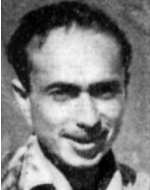Rothschild, Zvi (Enrique)
Son of Chana and Benjamin Sigmund was born on 7.11.1927 in Santiago, the capital of Chile, to well-to-do parents from Poland. When he was five years old, he was rescued from his father, who died in an airplane accident. Spent a year with his mother with her family in Poland and then returned to Buenos Aires, Argentina, where he began to attend school. After a few years they returned to Santiago and his mother remarried. For family reasons, he was sent for a few years to a school boarding school where rebelliousness developed and a tendency to seclusion and independence. He excelled in his studies and received his matriculation certificate in the biological track. He traveled to the United States and was accepted to the preparatory program for admission to the Faculty of Medicine at the University of California, Berkeley. After a few months he was tired of school and he began wandering. Zvi worked in various professions, earned a good salary and sometimes lived in wasteful life, sometimes in total destitution, and thus reached New York, seven wanderings and adventures. He returned to his studies at Berkeley and devoted himself to them. Zvi found his place in society and was active in sports. Preferred swimming “because it is an individual sport,” as he explained it. He aspired to practice in psychiatry and began to study literary experiments. Because of the illness of his stepfather he was telegramed home, to run the business in his place, and in his twenties he became involved in this preoccupation that he did not like, and acted with all seriousness and responsibility. He joined the ranks of educated young men and women and continued with a programmatic spiritual training, especially in the social sciences. When his stepfather was ready, he prepared the necessary documents to return to Berkeley University, and when he learned that the State of Israel was in need of volunteers from the diaspora. Without hesitation he joined a group of volunteers from South America. On the first day of June 1948, the group arrived in Haifa and after four days of vacation to join the Palmach joined the Palmach and joined the combat units. Palmach: A combination of work in the market with military training. He spent his short vacations on tours to get to know the country, and once he was given two weeks’ leave for his marriage to his girlfriend, who came as a Chili volunteer. Zvi served as an English-Spanish interpreter between the commanders and his South American colleagues. After serving in camps and various regiments, he was sent with his platoon to participate in Operation Horev. During an attack on an Egyptian outpost in the Rafah area, his daring increased his caution, and when he rose from the ground that was lit at the time, the enemy’s barqitta to approach and take a Tommygun submachine gun was hit and fell on the night of 2 January 1949. On the 20th of Tammuz 5709 (20.7.1949) he was transferred to the eternal rest of the military cemetery at Nahalat Yitzhak.
